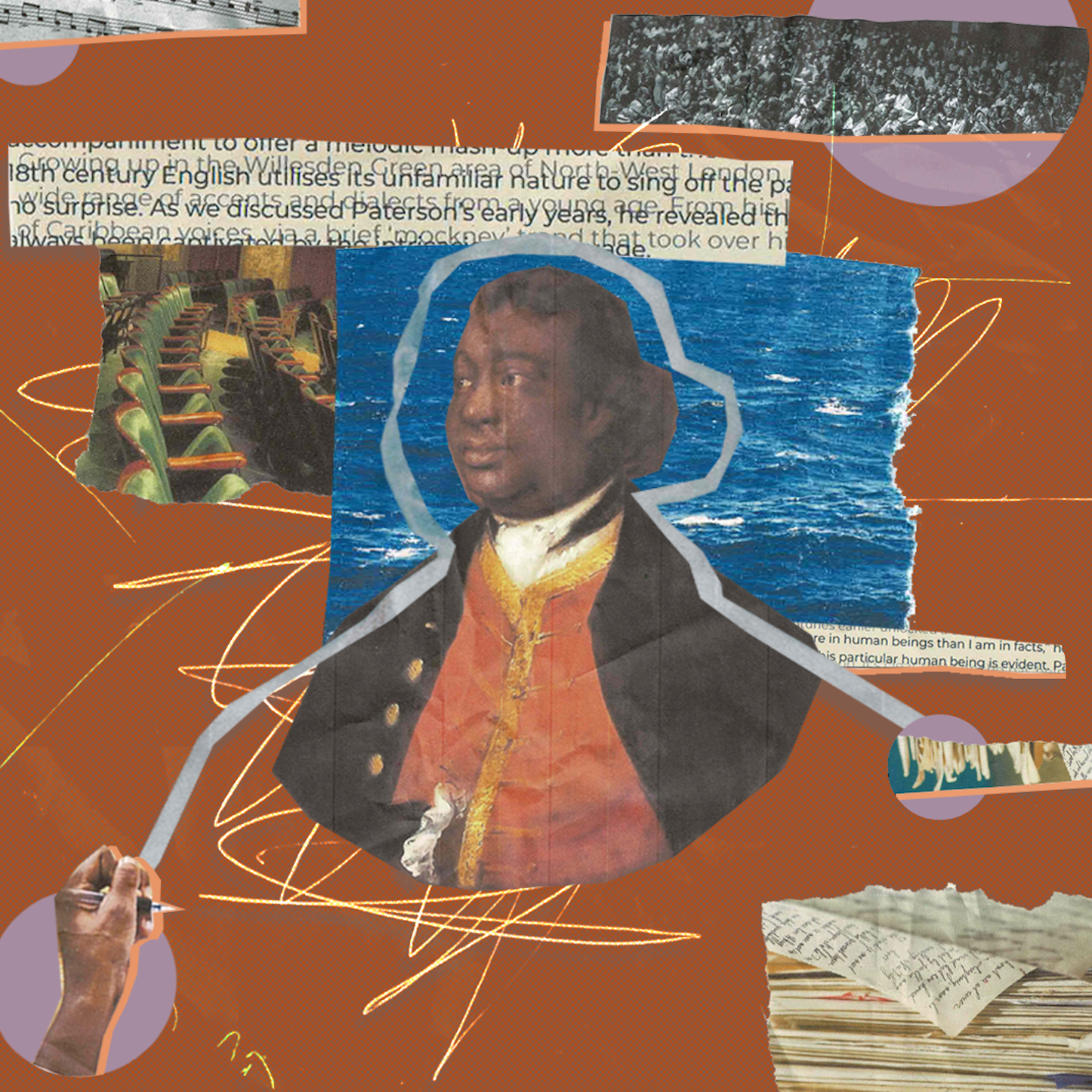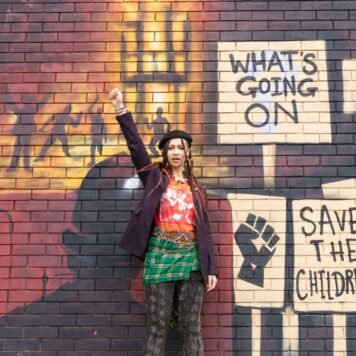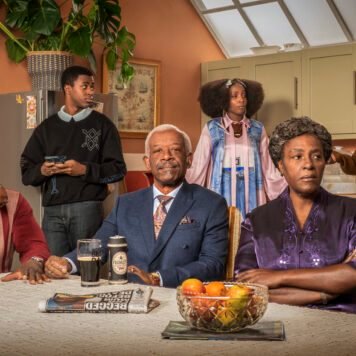“This book was written to tell our story,” writes Paterson Joseph in the opening line of his Author’s Note in The Secret Diaries of Charles Ignatius Sancho. “Yours and mine, whoever you are.”
The prolific British actor, famous for roles both on-stage and on-screen including Othello, Vigil and Peep Show, has just released his debut novel. This opening sentiment of belonging underlines the entirety of the book’s 411-page span, and immediately dispels the worry that, because this is a historical novel, it won’t be relatable to a modern audience.
In fact it’s quite the opposite, as Paterson takes us on a journey through Georgian London that’s equal parts rife with joy, humour, terror and sorrow – a human tale, littered with moments every reader can resonate with. It’s a story that feels grounded and real – because it is.
The first Black abolitionist
Charles Ignatius Sancho walked the streets of London from his childhood in the early 1730s to his death in 1780. Born on a slave ship that was crossing the Atlantic Ocean, he was taken to England by his owner at two years old after the death of both his parents. There, he was given to three sisters in Greenwich, where he remained up to the age of 18, before making his escape.
Sancho was introduced to high society and received a comprehensive literary education after a chance meeting with the Duke of Montagu, an encounter that would set him on the path to becoming one of Britain’s earliest and most influential Black abolitionists.
Before we go on, I feel it’s important to state outright that you shouldn’t feel bad about not recognising a name as important as Sancho’s. Not many of us will. The UK’s colonised curriculum has long been a hindrance when it comes to our collective understanding of Black history here at home, and whilst organisations like the National Education Union have been speaking on the need to decolonise education for years, reform at a meaningful scale still feels a while away.
It’s crucial, then, that books like Paterson’s are published. If we’re not hearing seminal Black stories in the classroom, the very least we can do is seek to educate ourselves with material that’s out there in the world – and you’d be hard pressed to find a better place to start than here.
The Secret Diaries follows Sancho’s journey through life – from rubbing shoulders with historical figures of the time such as Samuel Johnson and Laurence Sterne, to having his portrait painted by the legendary Thomas Gainsborough, to eventually owning his own shop and accruing enough property to become the first known Black man to vote in a general election.
The storytelling process
In telling Sancho’s story, Paterson leans on diary entries, first-person musings and letters to and from Sancho, richly bringing his world to life.
“I’m interested more in human beings than I am in facts,” he tells me as we talk over Zoom. Even on our video call, he gives off the kind of warmth usually associated with an old friend. Talking to me from his home, he’s relaxed – very much in his element – and his interest in one human being in particular is evident. Paterson shows me the famous Gainsborough portrait of Sancho that sits on his wall above him throughout our call. “That portrait, which kind of haunts me and stands over me all the time, was so stunning to me. I loved his story.” With this, I begin to understand what Sancho really means to him.
“Thankfully Sancho was quite verbose and literate, so he wrote about a lot of things that he could observe and his own thoughts,” Paterson says. It’s a fortunate truth which, combined with his extensive reading of contemporary scholars like Boswell and Johnstone, qualified Paterson to populate the 18th century setting Sancho occupied.
From these extracts, Paterson was able to truly get to grips with a man he already felt he knew – having portrayed Sancho in his own one-man show since 2015 – and expand upon his story in a much more personal sense. “I thought ‘what is his interior life like?’ That’s what led to the novel; it was a way I could really try to look out at the world through Sancho’s eyes.”
Linguistic exploration
On his journey of discovery, Paterson found that Sancho was “a bit obsessed with language, with showing off his erudition and his education,” and it’s in this that the similarities between subject and artist begin to come to the fore.
The mixture of Sancho’s hyper-literate writing style and Paterson’s prowess of performance and penmanship invites magic to happen across the pages of The Secret Diaries; resulting in language that’s so authentically of its time, yet so universally gripping and comprehensible, that you can’t help but be enveloped in the novel’s bygone setting.
“I’m the fifth child of two Caribbean migrants from St. Lucia, where they speak Kwéyòl,” Paterson explains, revealing his early captivation with language. “When I was three my parents stopped speaking it to me, but I remember at school, bits of Kwéyòl would drop out of my mouth and I didn’t even know what they were.”
This bilingualism – and the difficulties associated with understanding your place in the world as a bilingual child – led Paterson to “a bit of a crisis”; poor performance at school, rejection from his teachers, and then a closure of sorts. “I was very shy about speaking. My brain was whirring away, but I didn’t speak very freely.”
Growing up in the Willesden Green area of North-West London, Paterson was exposed to a wide range of accents and dialects from a young age. From his Irish peers to a rich harmony of Caribbean voices, via a brief ‘mockney’ trend that took over his school days for a time, he was fascinated with the cadences, timbres and tones that surrounded him. It was this fascination that eventually became imitation, and the words written by a certain playwright some four centuries earlier unlocked a deeper connection within him.
Shylock’s famous speech from Shakespeare’s The Merchant of Venice was a part of Paterson’s performance piece for his very first audition for the National Youth Theatre at the age of 14. “I found the character fascinating to me. He was experiencing what I would’ve experienced, this kind of rejection on the grounds of who he happened to be by birth.”
What followed was an interest in theatre that led Paterson to link up with actors like Lennie James, Adrian Lester and David Harewood, all at the beginnings of great careers. “For us it was both political – because we were in the Thatcher era – and artistic. And the two things, they still do, meld together. Acting became a kind of escape but also an education, and a way to fight back.”
“Anything that I write now, there’s still that edge to it of dealing with the class issue, dealing with the immigrant issue, dealing with what’s coming at us in a way I know how; with art – not with politics because it’s not my forte – but with art.”
Subscribe to shado's weekly newsletter
Exclusive event news, job and creative opportunities, first access to tickets and – just in case you missed them – our picks of the week, from inside shado and out.

And as we continue to talk about Sancho, Paterson describes his novel as “a crystallisation of those two disciplines – of understanding your place in the country that you’re in, of your birth country and your education, and understanding your outlier status, and being able to articulate that.”
This was a point that jumped out at me. Whether it’s Sancho in his texts, Paterson in his pages, or even me in the words you’re reading now; the ability to articulate yourself and your position in the world is one that’s truly invaluable.
I’ve found that it doesn’t just help others understand your perspective, but clear articulation allows you a certain level of catharsis – a way of “working something out”, as Paterson puts it, that not only leads to better work, but a clearer outlook on life.
It’s evident upon reading the novel that there is something of a reflection of the author within its pages. And it’s these parallels that make The Secret Diaries of Charles Ignatius Sancho a beautiful and important read. Paterson isn’t telling his own story through the life of Sancho – “I told his story as honestly as I could” – but he is, perhaps inadvertently, using his lived experience to create a believability in his main character. One that renders Sancho just as endearing and approachable in the text as the man who sits before me on my screen.
Otherness and belonging
And it checks out. Sancho’s is a story of otherness, rejection, growth, and eventually, success – just as Paterson’s is. Both are stories of belonging, and for Paterson, that’s what his novel is attempting to tackle. “All creative artists pour themselves somehow into their work, and there’s often a repetition of themes. That voice is your desire to express something that you haven’t quite finished expressing.”
From our conversation, it’s clear that Sancho has helped Paterson on his journey to figuring out what might have troubled his younger self. I can see that here is a man who’s comfortable with who he is; but someone who’s still tentatively, by his own admission, grappling with his identity as a Black Englishman. Yet the trials and tribulations of another who came so much further before are empowering. “Sancho’s about identity for me; he’s about saying ‘you belong here’ – and he’s given me such confidence, actually, even though he was there 235 years or so before me.”
It’s this that makes Secret Diaries a work we can all relate to, what really makes it “Our story” not just in name, but in nature. At a time when belonging and identity is still a tumultuous issue for so many British residents – as highlighted almost to the level of parody recently by Lady Hussey’s conversation with Ngozi Fulani at Buckingham Palace – there’s assurance to be taken from Sancho’s tale of determination and decision to say, as Paterson puts it, “this is who I am.”
“Sancho has something to teach us about belonging, and saying fuck it, even if they say I’m not a part of this country, I’m going to root myself where I’m planted.”
And there we have it – “a whistle stop tour of my mind!” exclaims Paterson with a smile and a laugh I can’t help but reciprocate. Our conversation offered up so many points of interest and brilliance that I’ve struggled to commit them all to this piece, but even the snippets left on my proverbial cutting room floor have left me inspired by his enthusiasm.
With The Secret Diaries of Charles Ignatius Sancho, Paterson Joseph has announced himself to the novel-writing world with a triumphant flourish. In his afterword, he implores readers to dive deep into the history of Sancho and his story, and to contact him if they discover something he himself has not. It’s not a challenge, but more of an invitation; a call for others to lose themselves and find inspiration, warmth and hope in the story that’s brought him so much of each.
I echo that sentiment. Read the book, introduce yourself to Paterson’s world, and – if only for the joy of chatting to the man – see what you can uncover and share. The final sentence of Paterson’s afterword seems the perfect way to depart, so I hope he won’t mind my stealing it…
“Keep an open mind and, happy history sleuthing.”
What can you do?
- Read The Secret Diaries of Charles Ignatius Sancho by Paterson Jospeh– available HERE and at all book stores.
- Check out Black History Bites, a collection of bitesized educational podcast episodes, giving you the rundown on everything from Black British climate activism to Caribbean mythology and how it affects culture here in the UK.
- Visit one of the many events across the country that the Black History Month Organisation are advertising – spanning conversations with intellectuals, exhibitions on untold black stories, and concerts by prominent and emerging black musicians.
- Watch some of the BBC documentaries on UK Black British history – Paterson Joseph recommends Subnormal by Lyttana Shannon.
- Another from Paterson Joseph, read Black England: A Forgotten Georgian History by Gretchen Gerzina – bringing Georgian Black Britain to life in vivid detail.
- Read more articles by Luke Crompton HERE














